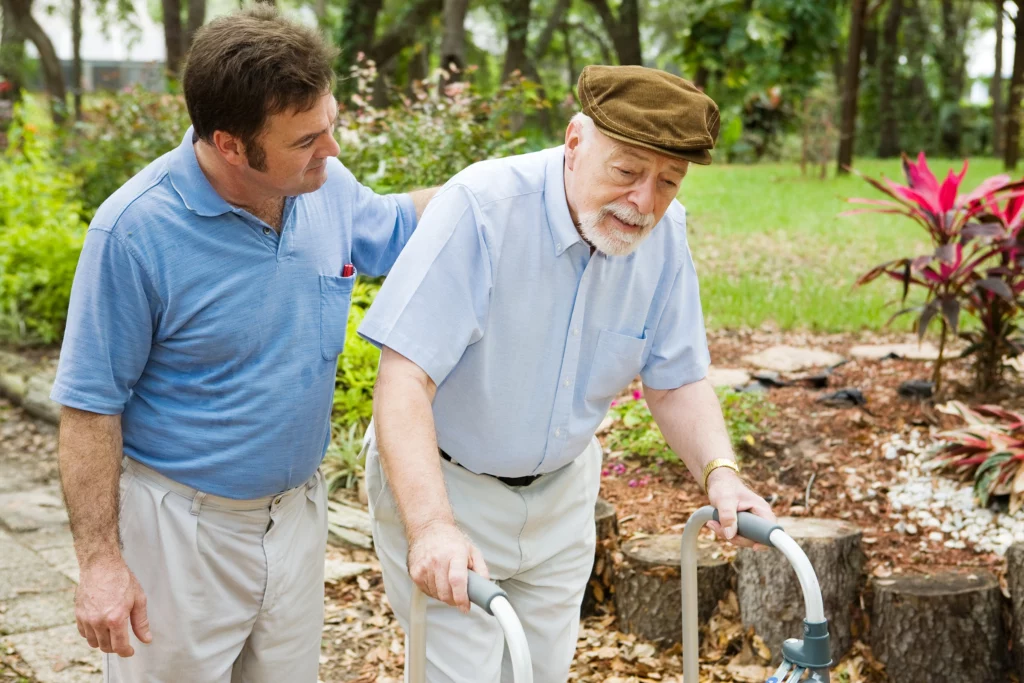
Lewy Body Dementia Rigidity and Muscle Stiffness Tips
This post may contain affiliate links or Google Ads and we may earn a small commission when you click on the links at no additional cost to you. As an Amazon Affiliate, we earn from qualifying purchases. This is at no additional cost to you and helps with our website expenses.
Lewy Body Dementia (LBD) is a degenerative brain disorder that affects the areas of the brain responsible for movement, cognition, and behavior. It is characterized by a progressive loss of memory and cognitive abilities, as well as motor control problems like rigidity. Lewy Body Dementia rigidity is one of the common symptoms of LBD and can have a significant impact on an individual’s quality of life.

Rigidity in LBD patients occurs when their muscles are continually tense, limiting their range of motion and ability to perform activities. In some cases, it can cause pain and other physical limitations such as difficulty walking or sitting upright. It also has an associated mental component due to its effect on balance and coordination. Patients may experience confusion or disorientation when trying to move around, which can lead to falls or other accidents due to lack of mobility.
Exercise to Help with Rigidity with LBD
For those living with Lewy Body Dementia, exercise can be a great way to help improve rigidity in certain muscles. Exercise is important for overall physical health and can help improve balance, posture and strength. The NIH National Library of Medicine article regarding exercise for individuals with LBD is very informative about this.
When it comes to exercising for Lewy Body Dementia symptoms, it’s important to focus on low-impact exercises that don’t require a lot of strength or coordination. Walking or swimming are both good options as they promote mobility without putting too much strain on the joints. Low-intensity stretching exercises like yoga may also help to alleviate some of the muscle stiffness that is often experienced by those living with Lewy Body Dementia.
Always consult with your physician before starting any exercise routine.
Caregiver Tips – Pillows and Bending
Muscle stiffness can be a hard condition to manage. It affects mobility, and comfort and can have a huge impact on daily life. Consider using U-shaped neck pillows. These pillows can provide support and relief from muscle stiffness, helping those affected by it to maintain their mobility.
The U-shaped neck pillow is versatile enough that it can be used anywhere on the body where there may be muscle stiffness, such as inside at the elbow bend or even under the chin if needed. It’s easy to use and provides effective relief for stiff muscles without needing any special tools or technology. Simply tuck the pillow wherever it may help and reap the benefits of increased comfort throughout day-to-day activities.
Bending and Foam Rollers
Another tip told to me by an occupational therapist is to bend from the hip as well as the knee. Foam rollers can also be used. The combination of them and body weight can help release the muscle tension. Talk to your own OT or PT about other methods that might help.
Dressing Difficulties because of Lewy Body Dementia Rigidity
For those living with LBD, this rigidity can prove to be a difficult challenge when it comes to dressing. In essence, rigidity causes muscles to become tight and inflexible, making it difficult for the person affected by LBD to move freely or maintain balance while dressing.
The consequences of this symptom can be further compounded by other physical symptoms such as poor coordination and tremors which make it hard for the person living with LBD to control movements in order to get dressed properly.
Clothing Items that make Dressing Easier when there is Lewy Body Dementia Rigidity
Clothes may be difficult to put on because the person can’t stretch their arms or legs appropriately. Here are some clothing tips for rigidity.
5X Tshirts
One tip for Lewy Body Dementia rigidity is to take a 5X shirt and cup it up the back. Leave the neckband. This makes less movement required when putting the shirt on.
These large shirts have moisture-wicking fabric that helps them keep cool and dry. The lightweight, stretchy material moves with them. They help them feel less restricted or weighed down. LEARN MORE
Hospital or Nightgowns
Look and feel comfortable in this soft open back nightgown for patients with Lewy Body Dementia rigidity and muscle stiffness. The design offers unique features that make it a great option for those who need extra comfort and mobility. The fabric is lightweight and breathable, allowing the patient to stay cool while they sleep. The open back provides unobstructed access to the patient’s back, making treatment easier and more comfortable.
The gown was designed with comfortability in mind and is gentle against the skin. It is ideal for sensitive skin. There are no tight bands or uncomfortable seams to cause discomfort or irritation. LEARN MORE
Slipon Shoes
Kizik hands-free shoes make putting on your shoes a breeze! With no bending over required, these shoes are perfect for those with arthritis or muscle stiffness who have difficulty reaching down to put on their shoes. They open up when the heel touches the back and close automatically when starting to walk. No more struggling with laces or straps!
My husband has a pair of Kizik shoes. He loves them. They have been a game-changer when getting dressed. He doesn’t have to bend over. Not tying shoelaces is great too!
Author
The innovative design of Kizik hands-free shoes offers superior comfort and support. The footbed is anatomically shaped and contours to the shape of your feet, helping improve balance and reduce fatigue. Plus, the foam cushioning ensures all-day comfort. LEARN MORE
Tearaway Pants
Silverts Disabled Elderly Needs Men’s Side Zip Adaptive Fleece Tearaway Pants work well for dementia patients to provide them with comfort and convenience. These pants feature a full-length side zipper that makes dressing and undressing easier than ever before. No need to worry about buttons or zippers getting caught in the fabric – these pants slip on and off in a flash!
The adaptive tearaway design allows for easy tear-away at the knees so caregivers can easily access disposable underwear or clothing underneath. Crafted from ultra-soft fleece material, these pants provide warmth and comfort all day long without feeling constricting or uncomfortable. LEARN MORE
In conclusion, Lewy Body Dementia rigidity and muscle stiffness can be a difficult condition to manage. It is important for individuals with LBD and their carers to know that managing this symptom can sometimes be helped through a combination of exercise, physical therapy, and lifestyle changes. As with any medical condition, it is essential to consult a doctor or healthcare provider if you are experiencing rigidity or muscle stiffness as part of LBD.








